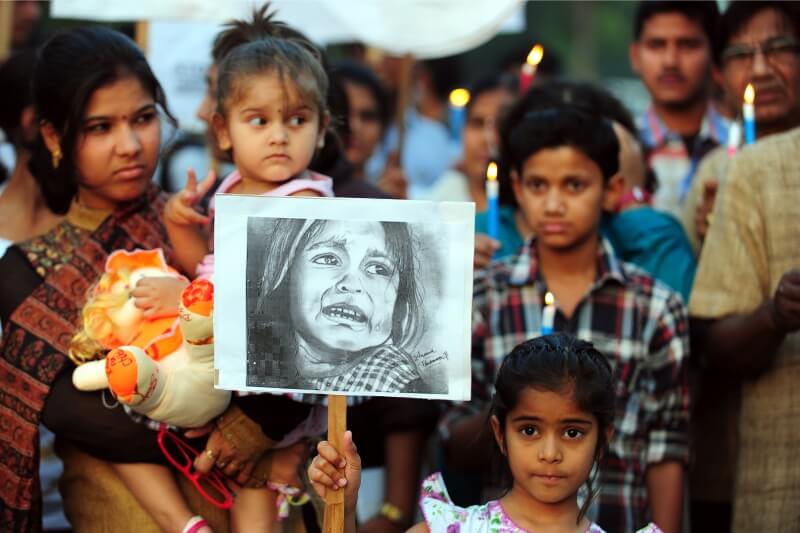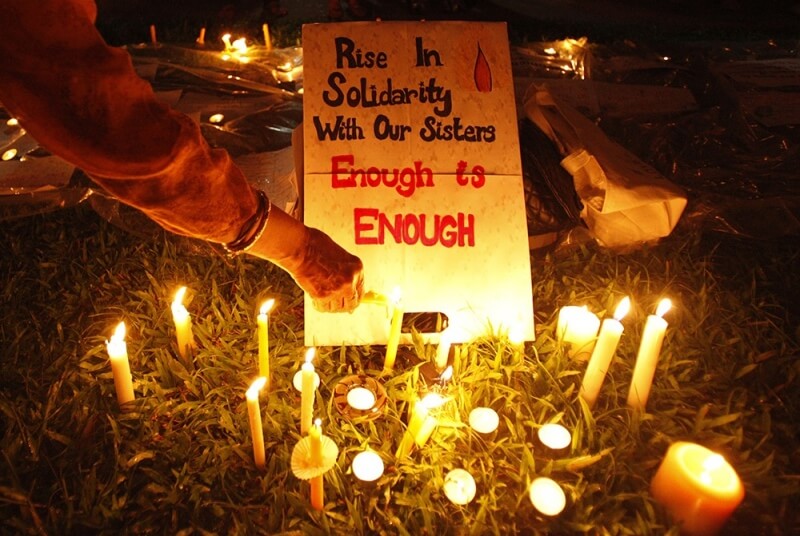Categories
Are India’s Anti-Rape Laws as Draconian as Madhu Kishwar Says They Are?, Scroll, 7th April, 2017
.A petition in the Delhi High Court has challenged the constitutional validity of the 2013 amendments to rape laws, triggering a debate among women’s groups.
In April 2013, driven by the national outcry over the December 2012 gang rape of a 23-year-old paramedical student in Delhi, the Union government made a series of amendments to the Criminal Law Act to strengthen India’s anti-rape laws. Now, barely four years later, a petition in the Delhi High Court has challenged the constitutional validity of those amendments, labelling them as “draconian” and unfair to men.
The public interest petition was filed on March 17 by social scientist Madhu Kishwar through lawyer Kapil Sibal, and the court has asked the Union government to respond to it at the next hearing scheduled for July 5.
One of Kishwar’s main contentions is that expanding the definition of rape to include non-penovaginal penetration is amenable to misuse, because such acts cannot be medically corroborated. The petition also argues that by raising the cut-off age for statutory rape, or child rape, from 16 years to 18 years, the law allows for criminalisation of consensual sexual relations between minors.
Another objection is to the stricter definition of consent and the significance given to the victim’s sole testimony against an accused person. The petition also severely criticises the seven-year mandatory minimum sentence provided for in the law, which takes away judicial discretion to award punishments that are proportional to the crime.
According to the petition, these amendments have led to a “startling spurt in false cases in Delhi”, including fraudulent charges and rape cases that should actually qualify as a breach of “promise to marry”. Kishwar’s contention is that since the amended law came into effect, it has led to the victimisation of several men whose reputations have been damaged.
The petition says: “The social context is also no longer one in which women hesitate to come forth with rape complaints. On the contrary, disappointed women in many failed relationships resort to a complaint under Section 376 IPC [Indian Penal Code]…‘Crying rape’ is commoner than it used to be.”
Kishwar believes these developments serve to discredit the women’s movement and encourage the perception of feminists as “feminazis”, a pejorative used to refer to some feminists. Kishwar’s petition has triggered debates among other women’s rights lawyers and activists. While some share certain concerns raised in the petition, others dismiss it as a complaint based more on hearsay rather than evidence.
A matter of statistics
Kishwar’s petition states that according to government-compiled statistics, “immediately following the amendments, there has been a disturbing spurt in the filing of rape complaints which have ultimately been found by courts to be false”.
This claim is accompanied by a statistic from the Delhi Commission for Women, which shows that 53% of the rape cases filed in Delhi between April 2013 to July 2014 were found to be “false”, and that there was a 22% rise in the number of acquittals in rape cases in that period as compared to the acquittals in 2012.
The only other statistics cited in the petition are also from Delhi, from a study done by The Hindu. The study found that 25% of the rape complaints filed in the capital in 2013 were cases of “breach of promise to marry”, while in another one-fifth of the cases, the complainants either turned hostile or did not show up in court. Besides this, 30% of the cases argued in Sessions Courts involved “elopement of the boy and girl, followed commonly by a complaint of abduction and rape by the girl’s family”.

Other women’s rights activists say that these figures are limited and not sufficient to demand a rollback on certain amendments made to the rape law just four years ago.
“How can one ask the court to consider changes to the law that has been in force for just four years, without any evidence or comprehensive study supporting the claims on which the PIL [Public Interest Litigation] is based?” said Madhu Mehra, executive director of Partners for Law in Development, a feminist legal resource group in Delhi. “Women’s rights activists are invested in this issue and would like to be informed by any studies on the working of the existing law. So my question is, where are the studies on which the PIL is based?”
Kavita Krishnan, secretary of the All India Progressive Women’s Association, pointed out that a large number of acquittals in such cases did not always mean that those rape complaints were false in themselves. “Acquittals happen for various reasons,” she said. “It could mean that not enough evidence was found to convict the accused, which could be an indication of failure at the stage of investigation. That doesn’t necessarily mean the woman cooked up the case.”
Age of consent
Most women’s groups tend to agree on the issue of the age of consent. However, feminist activist Chayanika Shah pointed out that this had been a concern for the women’s movement for several years, long before the Justice Verma Committee was instituted in 2013 to make recommendations on rape law amendments.
“Raising the age of consent is something that women’s groups have fought against consistently, even before 2013,” said Shah, a member of the non-profit Forum Against the Oppression of Women. “We have consistently argued that parents misuse the age of consent clause against minors, and even made a petition to the Justice Verma committee to that effect.”
There has been less consensus among women’s groups about “breach of promise to marry” cases, but a number of activists do agree that these cases cannot always be seen as rape. Krishnan, however, points out that such cases have been a problem even before the 2013 rape law amendments. “‘Promise to marry’ as rape is a judicial construct in India, and it is not really a part of the rape law at all,” she said.

Rape redefined
The most problematic aspect of Kishwar’s petition for activists like Shah and Krishnan is its critique of the new, expanded definition of rape to include acts of violation other than penovaginal penetration. The argument that such acts cannot be medically proven did not stand, they claim.
“The wider definition recognises a shift in the way we understand sexual assault – not as a measure of physical violence or bodily harm, but as a violation of one’s personhood,” said Shah. “Evidence should come not just from the body but also from the nature of the circumstances within which the assault has occurred.”
Besides, said Madhu Mehra, it is well recognised that even penovaginal rape cannot always be medically corroborated. This has been acknowledged in courts even prior to the amendments of 2013, and later by the new guidelines on medico-forensic examination by the health ministry and the Indian Council of Medical Research.
From her experience of working with hundreds of rape victims, however, lawyer Audrey D’Mello pointed out that widening the definition of rape has not really made much of a difference on the ground. “Cases are not really being filed under the new, broader definition or rape,” said D’Mello, a member of the Mumbai-based feminist legal group Majlis.
Mandatory minimums
The seven-year minimum jail term that the amended laws make compulsory for those convicted of rape is an equally contentious point. Kishwar’s petition takes pains to establish that in several Law Commission reports, mandatory minimum sentences were in themselves critiqued for being incongruent with the modern criminal justice system.
Activists like Mehra have been vocal in their support of mandatory minimum sentences provided that they come with some judicial discretion on the severity of punishment. Krishnan, meanwhile, believes that judicial discretion did not always work effectively in a system where judges come with their own biases against women.
For Shah, mandatory minimum sentences are not ideal, yet necessary.
“The idea is not to bay for anyone’s blood, but we do need some surety of action,” she said. “Unless you give mandatory minimum sentences, everything gets condoned. In a system where investigations are already so shoddy, how do you ensure that punishment is meted out?”
However, D’Mello claims that with respect to the rape law, the mandatory minimum sentences of seven years are having the opposite effect. “We have noticed that when punishments are more severe, it leads to a greater number of acquittals, because judges are not comfortable giving such strict sentences,” she said.
‘We need monitoring and evaluation’
Mehra believes that Kishwar’s petition not only challenges amendments to the rape law without sufficient evidence, but also misses the opportunity to raise certain other important questions. The petition, for instance, takes issue with acts of violence that cannot be medically verified. “But shouldn’t we be more concerned about the compliance with new medico-forensic guidelines, inadequate number of forensic laboratories and the consequent delays in submitting forensic reports, all of which compromise cases that can be medically corroborated?” asked Mehra.
She also emphasised the need to institute rigorous monitoring of the implementation of the 2013 amendments to track how the law works, understand the experience of victims, as well as the judicial reasoning and outcomes in such cases. Such monitoring is a necessary first step for evaluating the law and identifying possible revisions required, said Mehra.
“In the absence of any serious study or a process of dialogue with those working on these issues, the claims made in this petition seem rhetorical, and not designed to facilitate serious engagement with the issues raised,” said Mehra.
Madhu Kishwar declined to give a comment to Scroll.in for this report, but said that she would write her own rejoinder to the points raised in this article.
Source: Scroll.In





